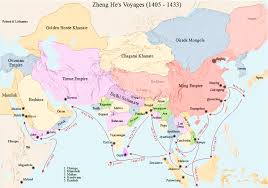What POD's would be required to create a Christian Imperial China with a powerful Overseas empire?
I was thinking along the lines of a continued Zheng He styled Voyages with Chinese colonies in Singapore, Ceylon (sri lanka) and East Africa.

The reason Behind the Christian Part is that traditional confusionism resulted in a inward, static society. Christianity requires expansion.
So, who can we make China Christian, Have a colonial empire and Capitalism?
I was thinking along the lines of a continued Zheng He styled Voyages with Chinese colonies in Singapore, Ceylon (sri lanka) and East Africa.
The reason Behind the Christian Part is that traditional confusionism resulted in a inward, static society. Christianity requires expansion.
So, who can we make China Christian, Have a colonial empire and Capitalism?